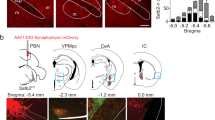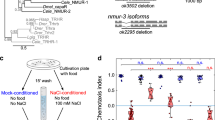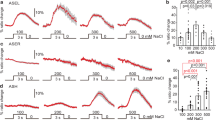Abstract
The processes underlying long-term memory formation in the neocortex are poorly understood. Using taste learning, we found learning-related induction of PSD-95 in the gustatory cortex, which was temporally restricted, coupled to the learning of a novel, but not familiar, taste and controlled by ERK. Using temporally and spatially restricted RNA interference knockdown of PSD-95 in vivo, we found that PSD-95 induction is necessary for learning novel tastes, but not for the recollection of familiar ones.
This is a preview of subscription content, access via your institution
Access options
Subscribe to this journal
Receive 12 print issues and online access
$209.00 per year
only $17.42 per issue
Buy this article
- Purchase on Springer Link
- Instant access to full article PDF
Prices may be subject to local taxes which are calculated during checkout



Similar content being viewed by others
References
Alberini, C.M. Trends Neurosci. 28, 51–56 (2005).
Rosenblum, K. Learning and Memory: A Comprehensive Reference 217–234 (Academic Press, New York, 2008).
Belelovsky, K., Elkobi, H., Kaphzan, A., Nairn, C. & Rosenblum, K. Eur. J. Neurosci. 22, 2560–2568 (2005).
Colledge et al. Neuron 40, 595–607 (2003).
Ehrlich, I., Klein, M., Rumpel, S. & Malinow, R. Proc. Natl. Acad. Sci. USA 104, 4176–4181 (2007).
Migaud, M. et al. Nature 396, 433–439 (1998).
Beique, J.C. & Andrade, R. J. Physiol. (Lond.) 546, 859–867 (2003).
Gray, N.W., Weimer, R.M., Bureau, I. & Svoboda, K. PLoS Biol. 4, e370 (2006).
Elias, G.M. et al. Neuron 52, 307–320 (2006).
Berman, D.E., Hazvi, S., Rosenblum, K., Seger, R. & Dudai, Y. J. Neurosci. 18, 10037–10044 (1998).
Zalfa, F. et al. Nat. Neurosci. 10, 578–587 (2007).
Almeida, C.G. et al. Neurobiol. Dis. 20, 187–198 (2005).
Skibinska, A., Lech, M. & Kossut, M. Neuroreport 12, 2907–2910 (2001).
Beique, et al. Proc. Natl. Acad. Sci. USA 103, 19535–19540 (2006).
Sweatt, J.D. Curr. Opin. Neurobiol. 14, 311–317 (2004).
Acknowledgements
We thank G. Hannon (Cold Spring Harbor Laboratory) and P. Osten (Northwestern University, USA) for providing DNA vectors. We are grateful for the generous support of R. Malinow (Cold Spring Harbor Laboratory) and A. Lüthi (Friedrich Miescher Institute), in whose laboratories the lentiviruses were produced and characterized. We wish to thank A. Fine for constructive comments on the manuscript. This research was supported by the Israel Science Ffoundation and a Gene Memory Research Training Network EU grant to K.R.
Author information
Authors and Affiliations
Corresponding author
Supplementary information
Supplementary Text and Figures
Supplementary Figures 1–5 and Supplementary Methods (PDF 1943 kb)
Rights and permissions
About this article
Cite this article
Elkobi, A., Ehrlich, I., Belelovsky, K. et al. ERK-dependent PSD-95 induction in the gustatory cortex is necessary for taste learning, but not retrieval. Nat Neurosci 11, 1149–1151 (2008). https://doi.org/10.1038/nn.2190
Received:
Accepted:
Published:
Issue Date:
DOI: https://doi.org/10.1038/nn.2190



